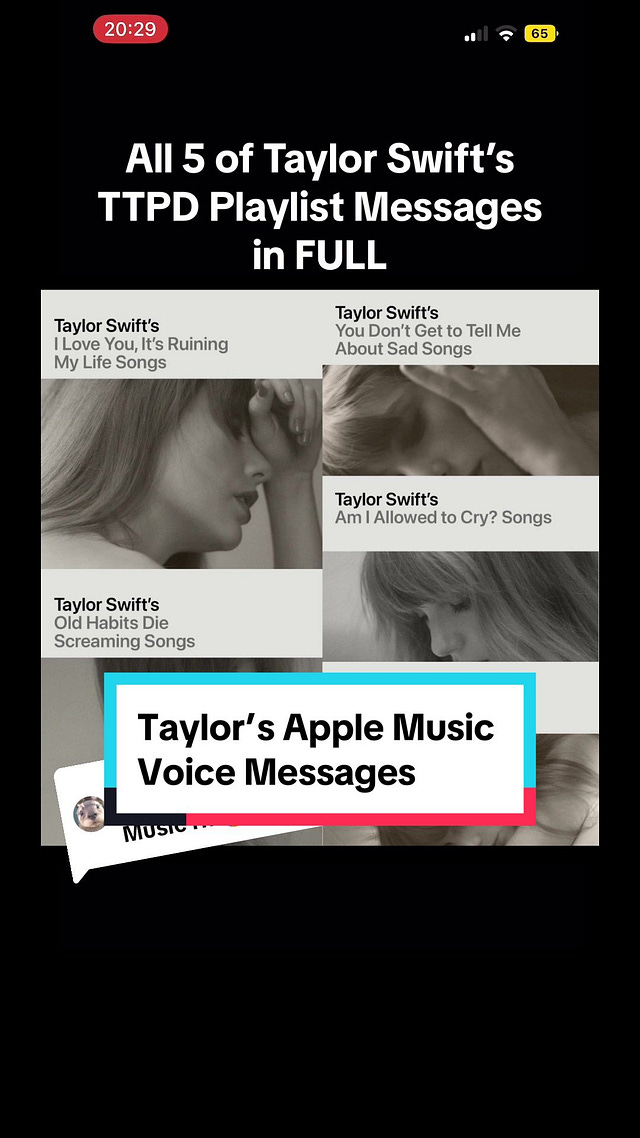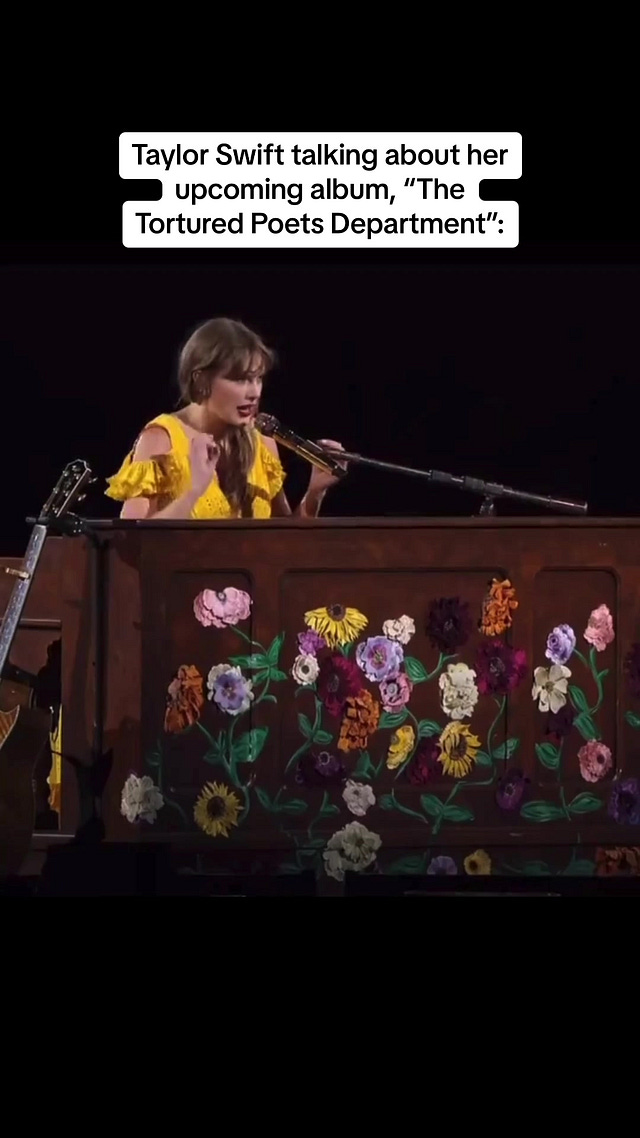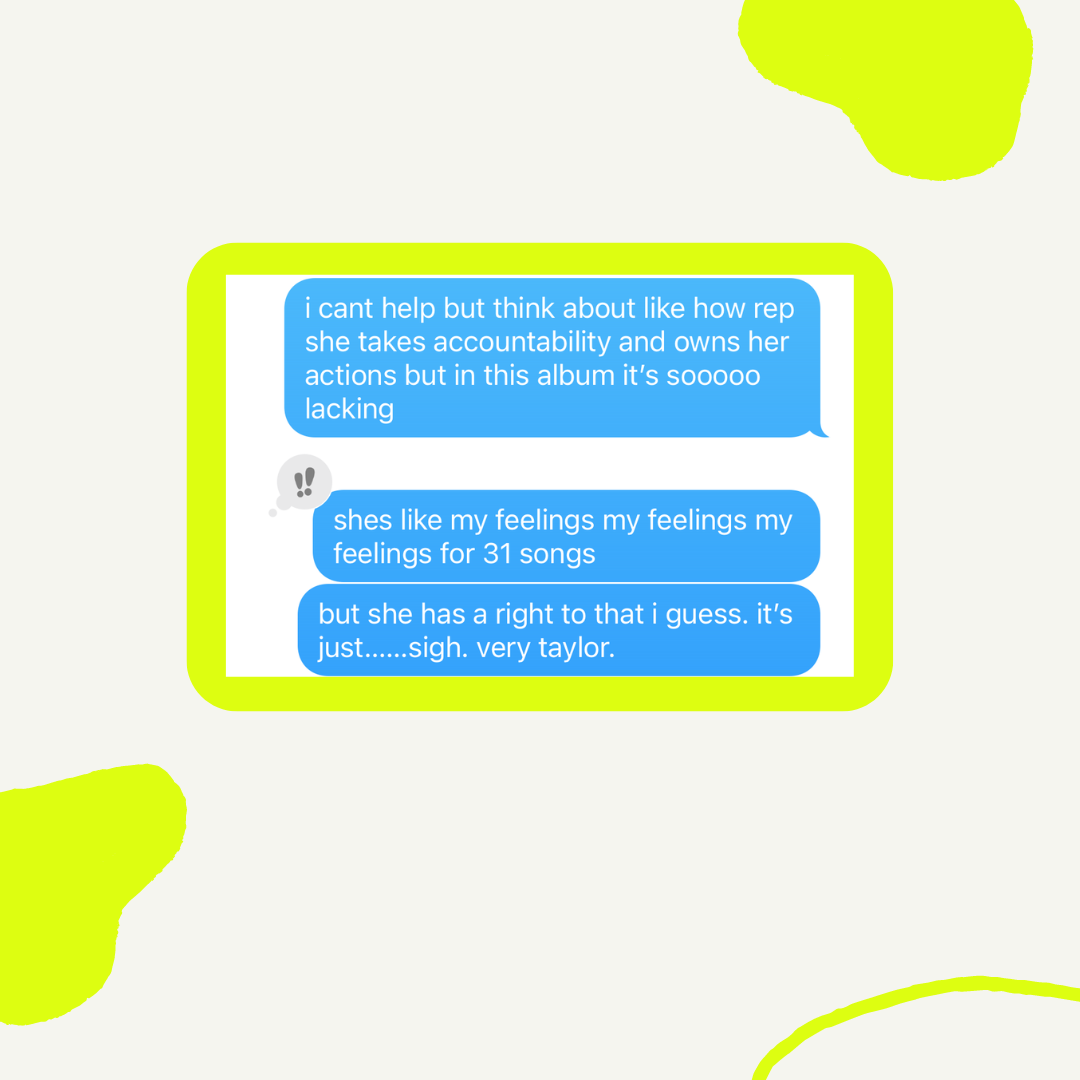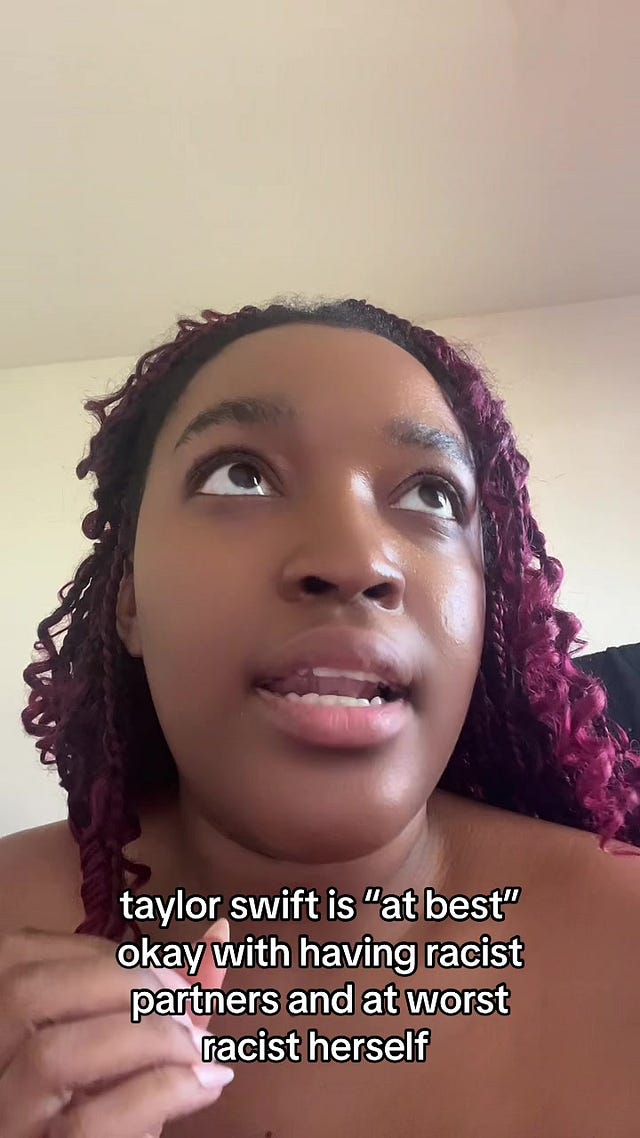Hi there! This is part two of a series on Taylor Swift as a cultural topic of conversation. You can read part one here. The footnotes are hilarious, so if they are cut off in your inbox, click the title to read in full! To listen to this post instead, become a paid subscriber and scroll to the very bottom.
Girl, same.
The first time I listened to it, I wanted to flip a table. The second time I listened to it, I wanted to flip two tables. The twentieth time, I wanted to flip another few tables — but also dance a little.
The “it” that I’m referring to is THE TORTURED POETS DEPARTMENT — yes, in all caps. Even now, as I’m about to reflect on a certain “ick” that oozes from its cracks, I almost forgot myself. I am writing this unironically bopping to every track.
Blondie1, unfortunately, was right: She really does put narcotics into all of her songs! And that’s why we’re still singin’ along! She really is never beating the sorcery allegations! As a devoted listener, you can try to outsmart or outrun (I’m sorry, you have to click that) whatever new music she releases, but it will always catch up to you. And on April 19th, 2024, my Problematic Queen set out like the runner and the track star she is once again. Girl, now I’m tortured, too!
Full display.
In part one of this series, we left off talking about the debut of Taylor’s 8th studio album folklore, released in the Lord’s year 2020. According to me and maybe only me — and my enabler of a friend, Laura, lol — this was the first time I witnessed inklings of what Laura now dubs “The Last Great American Dynasty” dynamic (AKA, Taylor’s all about “ME!” mentality) at play inside of her music.
What might have been a subtle or completely invisible string to most shan’t pass my critical eye. folklore’s 2020 release made me realize: Taylor, as a self-proclaimed force for good, would never actually use her vocal privilege to full capacity — especially if it was risky to her career, her safety, or really just had nothing to do with her or with whiteness in general (sorry to be frank). Then earlier this year, Taylor Swift’s 11th studio album — also known as TTPD for short — came out. It blew my theory wide open. She won’t even use half of it!
THE TORTURED POETS DEPARTMENT is arguably her most controversial album. Ever. (We’ll get into that!) We witness Taylor’s avoidant tendencies on full display. And to that, she literally, actually, directly says to us via song: IDGAF. (Exhibit A: “I’m telling him to floor it to the fences / No, I'm not coming to my senses.” Exhibit B: “I'll tell you something about my good name / It's mine alone to disgrace”) Bold!
Two hours after its initial release at midnight, it was released again as a “double album” (whatever that means) with a second volume of 15 additional songs to make the 31-song THE TORTURED POETS DEPARTMENT: THE ANTHOLOGY. Devout and non-devout listeners were abuzz, and not all necessarily with excitement — but with overwhelm.
Some argued the album was raw, honest, and brave. Others, that it was ambling, navel-gazing, and too fucking long. I teetered. If I remove every single one of my own personal preferences and biases, musically and lyrically, I thought to myself after a few listens, I can appreciate this album for what it is trying to achieve. I kind of hated it, but I could also make a case for it.
The gift.
At its best, its honest. Taylor’s propensity to get stuck in her own world manifests as wicked good songwriting and widespread resonance because she is always getting to the bottom of herself and her emotions — and that’s what art does. On top of that, brick by brick, she has created an entire universe through recurring symbols and images savvily woven into her music. Not just from song to song, but album to album.
A lot of artists create a vibe. (Read: Brat Summer, which I’m not even linking to an explanation or photo of because I wanted this newsletter to be lime green when I first got the idea for it two years ago, and I’m petty!). Taylor Swift creates a language.
If you tell me your holy trinity of Taylor Swift albums (reputation, Red, folklore…but also Lover?), or the album that got you through the most (1989), or the song you play the loudest (“The Very First Night (Taylor’s Version) (From The Vault)”), or your top three Taylor tracks of all time (for the sake of my sanity, every song on reputation and Red and a quarter of Speak Now…and maybe Fearless), or your astrological birth chart as Taylor Swift eras (I feel like I have to be a Lover sun, an evermore moon, and reputation rising), I suddenly know so much more about you than you could tell me in five minutes — and in a surprisingly meaningful way. That’s because Taylor Swift has detailed a map of our inner emotional worlds by detailing her own. It’s the gift she has worked to give millions of people. This album does this maybe best of all.
Every song tells a new story the more you listen to it (one of my favorite all-time examples is this explanation of “Maroon” from Midnights). In “Guilty as Sin?” she sings, “I keep these longings locked / In lowercase inside a vault,” which might hint that her “From the Vault” songs added to her re-recorded albums or her newer albums with lowercase titles (reputation, folklore, evermore) actually contain secret longings about a specific person from across the years.
This explanation of “But Daddy I Love Him” made me understand the song in an entirely new way. Sitting with “Who’s Afraid of Little Old Me? nearly four months after it was released, I’m starting to suspect in both of these songs, Taylor might not be scolding her fans and listeners. There’s a real possibility they are angry letters to her creative team, including her father, who could have possibly advised her against a controversial relationship (more on that in a second).
From there, my thoughts transformed again! Could it be a memo to 21-year-old popular singer Olivia Rodrigo, who I’m convinced thought Taylor (her musical role model) was helping her personally and not professionally on a song, and was shocked when Taylor wanted credit/rights/money to whatever she contributed her idea to? Who knows!
Taylor Swift has detailed a map of our inner emotional worlds by detailing her own.
You can deny a lot of things about Taylor Swift, but it’s hard to deny that she has an alluring way of playing with words and ideas. (I’m sorry, please put her in the hall of fame for writing, “Messy top! lip! kiss! / How I long for our trysts.”) Her lyrics are specific, yet shrouded in mystery. Her discography is living, breathing, evolving. It is smart. Not every artist can say that.
The curse.
At its worst, the album feels like an untethered tantrum (teenage petulance, as Taylor calls it). I teach all of my students in my writing classes that the difference between a personal diary and a personal essay is purpose. A diary is for dumping, an essay is for turning the personal into the universal. Great writing requires the examination of ones self. But is Taylor Swift exempt from that now at her most famous?
Taylor Swift has worked relentlessly and admirably to build her empire around the idea that making music is art, and that it’s important. But TTPD feels less like art than it does a vessel to feel her feelings. It’s more about catharsis than meaning. There are no learnings, just yearnings. It is an unfiltered cigarette. And — I don’t know — maybe she shouldn’t smoke!
If Taylor Swift is a microcosm for how our society interacts today, then the aforementioned song “But Daddy I Love Him” is a microcosm for The Tortured Poet’s Department. It sums up the forthcoming, fingers-in-my-ears tone of this album in 5 minutes and forty seconds.
Everyone was mad at her boyfriend for his very public, offensive remarks and crude jokes (more on this later). Everyone wanted her to address where she stood on it in some way, or even break it off with him altogether. She had no plans to end things with him, but then he ghosted her. She wants to know if she’s allowed to cry. She decides that you don’t get to tell her about sad. My Problematic Queen is forever missing the point.
The prophecy.
“I write entirely to find out what I'm thinking,” Joan Didion famously said. This is true for many writers and creatives. Taylor even told millions of fans that she needed to make this album and that it was a lifeline for her.
I’ve been there, sister. Believe me! I get it. Sometimes, you have to write — not just to get through something — but to make sense of it. But similar to the thesis of this album, the rest of the aforementioned Joan Didion quote is often truncated. “I write entirely to find out what I'm thinking, what I'm looking at, what I see and what it means. What I want and what I fear,” Didion says in entirety.
Taylor wrote entirely to find out what she was thinking, what she was looking at, and what she sees. She absolutely, devastatingly, beautifully speaks to what she wants and what she fears in one of my favorites, The Prophecy (“Change the prophecy / Don't want money / Just someone who wants my company / Let it once be me / Who do I have to speak to / About if they can redo the prophеcy?"). But she did not seem to take any interest in what any of it actually means. She just needed to get it out, and she said so herself.
“Needing” to get it out — and being able to get it out, especially in such a public way and without major repercussions on her livelihood or on her career — is a privilege. Not everyone has that luxury.
The self.
In some of Taylor’s best and most popular songs, she reckons with herself. This happens frequently enough in her records, from Lover’s “The Archer” (“Combat, I'm ready for combat / I say I don't want that, but what if I do?” and “I've been the archer / I've been the prey / Who could ever leave me, darling? / But who could stay?”) to Midnight’s “Anti-Hero” (“I'll stare directly at the sun but never in the mirror” and “It’s me / Hi / I’m the problem, it’s me”) and even 1989’s “Blank Space,” in which she cleverly embodies the neurotic serial dater the media portrays her to be.
When she does this — when she examines her own behavior, complicity, or proclivities — it is POWERFUL. I love these songs because it’s almost as if she’s saying, I know, I know. True reflection makes the music more real and resonant. Like I penned as a hearty, humbling reminder to myself in my book, Note to Self: Little reminders about life, love, people, and that tiny voice inside: “People suck. Yourself not excluded.”
Taylor Swift is capable at clapping back in a refreshing, entertaining, and self-aware way. In fact, she’s a master at it. But the closest thing we get to acknowledgment in TTPD is the song “I Can Fix Him (No Really I Can)” (but, really, she’s just admitting that she’s fine with entering a relationship with a partner who has a record of being deeply problematic, or is openly or subtly racist — more on that in a second).
For the first time in a while, she doesn’t address the core issue at all. If it’s wrong, she doesn’t want to be right. She just wants to feel.
Love and betrayal.
What she wants to feel is her deep love and consequent betrayal by Matty Healy, the lead singer of the British band The 1975. He is likely who she references as “the band” in “Bejeweled” on her previous album, and it is all but confirmed that most of the songs on TTPD are about him.
Matty Healy, who I unfortunately cannot deny did something for me when I first saw this video, is known for making out with fans on stage (I’m sorry, but I kind of love that) as well as questioning a female rapper’s ethnic background and doing racist impressions of an Asian person on an audio show2 (I’m not sorry, I definitely don’t love that).
“I loved your hostile takeovers / Encounters closer and closer / All your indecent exposures,” she writes in the TTPD song, “Down Bad.” “The jokes that he told across the bar / Were revolting and far too loud” she pens in “I Can Fix Him (No Really I Can).” “I would've died for your sins / Instead, I just died inside,” she sings in “The Smallest Man Who Ever Lived.”
A large faction of fans began questioning why Taylor would be romantically linked to someone who would willingly say and do something so incautiously abhorrent that is so at odds with the moral compass and values she has vocally adapted and publicly woven into her image and music. (He has since sort of kind of apologized on stage at one of his concerts.) She had nothing to say. The self-proclaimed Miss Americana is gone, chile!

The dissonance.
Just when I’m tired of hearing her eye-rolling, utterly unnecessary claims (like “I’ll tell you something right now / I'd rather burn my whole life down / Than listen to one more second of all this bitching and moaning”), she says something painfully profound (like “You wouldn't last an hour in the asylum where they raised me” or “I just learned these people only raise you / To cage you.”)
Just when she throws an ignorant, immature hissy fit (like “They slammed the door on my whole world” or “I'll build you a fort on some planet / Where they can all understand it”), I gawk over a mature, simple yet stunning confession (like “And I’m pissed off you let me give you all that youth for free” or “I’m just getting color back into my face / I’m just mad as hell cause I loved this place”).
Just when she says something cringe (like “Try and come for my job!”) or whiny (like “Little did you know / Your home's really only the town you'll get arrested”) or absolutely fucking ridiculous out of her own mouth (like "My friends used to play a game where we would pick a decade we wished we could live in instead of this / I'd say the 1830s but without all the racists and getting married off for the highest bid”), she says something refreshingly funny (like “I’m having his baby / No I’m not!”) or cheeky and memorable (like “I love you / It’s ruining my life”) and the entire bridge and outro of “The Smallest Man Who Ever Lived.”
It’s clever and biting. (Like “You wouldn't last an hour in the asylum where they raised me” or “Is it a wonder I broke? / Let's hear one more joke / Then we can all just laugh until I cry.”) It’s heartbreaking. (How can “I stopped trying to make him laugh / Stopped trying to drill the safe” not take you back to a time you so desperately tried to keep someone who clearly didn’t want to stay?) It’s delicious. It’s so fucking out of touch. It’s annoying. It’s good.
And yet.
I get glimmers of the heart in TTPD. It’s about a person who is learning how to make decisions for herself that aren’t necessarily validated by others. It’s about how devastating things can happen to someone no matter how much money or power or talent they have. It’s about going through life with a spotlight on you, and what that does to a human being with human feelings. But like I said, this girl opted for an unfiltered cigarette. There’s so much smoke I can’t see the more meaningful parts clearly.
Yes, its 31 tracks are messy and sprawling. But perhaps messy and sprawling is the point. Perhaps it really is (Taylor’s Version) of a tortured poetry book. Perhaps the purpose of this personal essay of hers is to reflect that messy and sprawling mental state. Perhaps it is a long text created to be stewed on like a rich stock gaining flavor as it simmers, or to be chewed on over time, like dog being held over with a bone. Or perhaps, it’s just a lingering rip tide in an endless ocean that no one planned to end up in from the harbor.
The album had the opportunity to really say something significant, while still being really raw and really excellent. Instead, it’s raw for the sake of…well…what?
This album did make one thing very clear: It is not for anyone else. It’s for her.
I’d love to hear from you in the chat or comments! Did Tree Paine (her famed publicist) pay off Matty Healy to never speak to Taylor again? Is “Who’s Afraid of Little Old Me” about Olivia Rodrigo, Taylor’s team, her listeners, or all three? Why does Taylor talk about Texas and FLORIDA!!! so much in this album?! What other parallels are you seeing? Join the chat! Let’s discuss!
Thanks for reading In Deep with Mia Brabham Nolan! Subscribe for free to receive new posts, or become a paid subscriber to help support my work (and pay my incredible editor, Rebecca). All silly little opinions are my own. I’m so glad everyone in Vienna is safe.
Next time, we’ll discuss how Taylor’s bodies of work compare to extraordinary contemporaries like Beyoncé and Ariana Grande. See you in your inbox for part three! And become a paid subscriber to listen to this episode below instead.
Keep reading with a 7-day free trial
Subscribe to In Deep with Mia Brabham Nolan to keep reading this post and get 7 days of free access to the full post archives.













